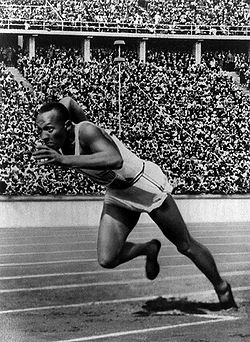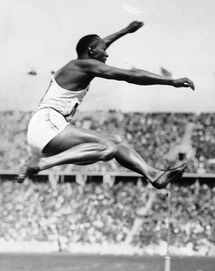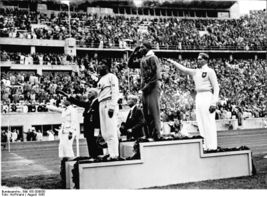Jesse Owens
 Jesse Owens in 1936 |
||||||||||||||||||||||||
| Personal information | ||||||||||||||||||||||||
|---|---|---|---|---|---|---|---|---|---|---|---|---|---|---|---|---|---|---|---|---|---|---|---|---|
| Full name | James Cleveland Owens | |||||||||||||||||||||||
| Nationality | American | |||||||||||||||||||||||
| Date of birth | September 12, 1913 | |||||||||||||||||||||||
| Place of birth | Oakville, Alabama, USA | |||||||||||||||||||||||
| Date of death | March 31, 1980 (aged 66) | |||||||||||||||||||||||
| Place of death | Tucson, Arizona, USA | |||||||||||||||||||||||
| Sport | ||||||||||||||||||||||||
| Sport | Track and field athletics | |||||||||||||||||||||||
| Event(s) | Sprint, Long jump | |||||||||||||||||||||||
|
||||||||||||||||||||||||
James Cleveland "Jesse" Owens (September 12, 1913 – March 31, 1980) was an American track and field athlete. He participated in the 1936 Summer Olympics in Berlin, Germany, where he achieved international fame by winning four gold medals: one each in the 100 meters, the 200 meters, the long jump, and as part of the 4x100 meter relay team.
Contents |
Childhood
James Cleveland Owens was born the seventh of eleven children of Henry and Emma Alexander Owens in Oakville, Alabama on September 12, 1913. "J.C.", as he was called, was nine when the family moved to Cleveland, Ohio for better opportunities, as part of the Great Migration, when 1.5 million African Americans left the segregated South. His new teacher nicknamed him Jesse. When she asked his name to enter in her roll book, he said J.C., but because of his strong Southern accent, she thought he said "Jesse". The name took and he was known as Jesse Owens for the rest of his life.[1]
As a boy and youth, Owens took different jobs in his spare time: he delivered groceries, loaded freight cars and worked in a shoe repair shop.[2] During this period, Owens realized that he had a passion for running. Throughout his life, Owens attributed the success of his athletic career to the encouragement of Charles Riley, his junior-high track coach at Fairmount Junior High. Since Owens worked in a shoe repair shop after school, Riley allowed him to practice before school instead.
Owens first came to national attention when he was a student of East Technical High School in Cleveland; he equaled the world record of 9.4 seconds in the 100-yard (91 m) dash and long-jumped 24 feet 9 ½ inches (7.56 m) at the 1933 National High School Championship in Chicago.[3] Owens's record at East Technical High School directly inspired Harrison Dillard to take up track sports.
Ohio State University
Owens attended the Ohio State University after employment was found for his father, ensuring the family could be supported. Affectionately known as the "Buckeye Bullet," Owens won a record eight individual NCAA championships, four each in 1935 and 1936. (The record of four gold medals at the NCAA was equaled only by Xavier Carter in 2006, although his many titles also included relay medals.) Though Owens enjoyed athletic success, he had to live off campus with other African-American athletes. When he traveled with the team, Owens was restricted to ordering carry-out or eating at "black-only" restaurants. Similarly, he had to stay at "blacks-only" hotels. Owens did not receive a scholarship for his efforts, so he continued to work part-time jobs to pay for school.
Owens's greatest achievement came in a span of 45 minutes on May 25, 1935 at the Big Ten meet in Ann Arbor, Michigan, where he set three world records and tied a fourth. He equaled the world record for the 100-yard (91 m) sprint (9.4 seconds); and set world records in the long jump (26 feet 8¼ inches (8.13 m), a world record that would last 25 years); 220-yard (201.2 m) sprint (20.3 seconds); and 220-yard (201.2m) low hurdles (22.6 seconds, becoming the first to break 23 seconds).[4] In 2005, NBC sports announcer Bob Costas and University of Central Florida professor of sports history Richard C. Crepeau both chose these wins on one day as the most impressive athletic achievement since 1850.[5]
Owens was a member of Alpha Phi Alpha, the first intercollegiate Greek-letter organization established by and for African Americans.
Berlin Olympics

In 1936, Owens arrived in Berlin to compete for the United States in the Summer Olympics. Adolf Hitler was using the games to show the world a resurgent Nazi Germany.[6] He and other government officials had high hopes that German athletes would dominate the games with victories (the German athletes achieved a "top of the table" medal haul). Meanwhile, Nazi propaganda promoted concepts of "Aryan racial superiority" and depicted ethnic Africans as inferior.[6][7]
Owens surprised many[6] by winning four gold medals: On August 3, 1936 he won the 100m sprint, defeating Ralph Metcalfe; on August 4, the long jump (later crediting friendly and helpful advice from Luz Long, the German competitor he ultimately defeated);[4] on August 5, the 200m sprint; and, after he was added to the 4 x 100 m relay team, he won his fourth on August 9 (a performance not equaled until Carl Lewis won gold medals in the same events at the 1984 Summer Olympics).
Just before the competitions, Owens was visited in the Olympic village by Adi Dassler, the founder of the Adidas athletic shoe company. He persuaded Owens to use Adidas shoes, the first sponsorship for a male African-American athlete.[8]
The long-jump victory is documented, along with many other 1936 events, in the 1938 film Olympia by Leni Riefenstahl.
On the first day, Hitler shook hands only with the German victors and then left the stadium. Olympic committee officials insisted Hitler greet every medalist or none at all. Hitler opted for the latter and skipped all further medal presentations.[9][10] On reports that Hitler had deliberately avoided acknowledging his victories, and had refused to shake his hand, Owens recounted:[11]
When I passed the Chancellor he arose, waved his hand at me, and I waved back at him. I think the writers showed bad taste in criticizing the man of the hour in Germany.

Hitler expressed his feelings about Owens and Africans in private. Albert Speer, Hitler's architect and later war armaments minister, recollected:
Each of the German victories, and there were a surprising number of these, made him happy, but he was highly annoyed by the series of triumphs by the marvelous colored American runner, Jesse Owens. People whose antecedents came from the jungle were primitive, Hitler said with a shrug; their physiques were stronger than those of civilized whites and hence should be excluded from future games.[12]
Owens was cheered enthusiastically by 110,000 people in Berlin's Olympic Stadium; on the street, Germans sought his autograph. Owens was allowed to travel with and stay in the same hotels as whites, while at the time blacks in many parts of the United States were denied equal rights. After a New York City ticker-tape parade of Fifth Avenue in his honor, Owens had to ride the freight elevator at the Waldorf-Astoria to reach the reception honoring him.[4]
Owens said, "Hitler didn't snub me—it was FDR who snubbed me. The president didn't even send me a telegram."[13] Jesse Owens was never invited to the White House nor bestowed honors by presidents Franklin D. Roosevelt (FDR) or his successor Harry S. Truman during their terms. In 1955, President Dwight D. Eisenhower honored Owens by naming him an "Ambassador of Sports."
Post Olympics
He was quoted saying the secret behind his success was “I let my feet spend as little time on the ground as possible. From the air, fast down, and from the ground, fast up.”[14][15]
After the games had finished, the Olympic team and Owens were all invited to compete in Sweden. He decided to capitalize on his success by returning to the United States to take up some of the more lucrative commercial offers. United States athletic officials were furious and withdrew his amateur status, ending his career immediately. Owens was angry, saying, "A fellow desires something for himself."
Prohibited from amateur sporting appearances to bolster his profile, Owens found the commercial offers all but disappeared. In 1946, he joined Abe Saperstein in the formation of the West Coast Baseball Association (WCBA), a new Negro baseball league; Owens was vice-president and the owner of the Portland (Oregon) Rosebuds franchise.[16] He toured with the Rosebuds, sometimes entertaining the audience in between doubleheader games by competing in races against horses.[17] The WCBA disbanded after only two months.[16][17] He helped promote the exploitation film Mom and Dad in black neighborhoods. He tried to make a living as a sports promoter, essentially an entertainer. He would give local sprinters a ten or twenty-yard start and beat them in the 100-yd (91 m) dash. He also challenged and defeated racehorses; as he revealed later, the trick was to race a high-strung thoroughbred that would be frightened by the starter's shotgun and give him a bad jump. Owens said, "People say that it was degrading for an Olympic champion to run against a horse, but what was I supposed to do? I had four gold medals, but you can't eat four gold medals."[18]
Owens ran a dry-cleaning business and worked as a gas station attendant to earn a living. He eventually filed for bankruptcy. In 1966 he was successfully prosecuted for tax evasion. At rock bottom, he was aided in beginning rehabilitation. The government appointed him a U.S. "goodwill ambassador." Owens traveled the world and spoke to companies such as the Ford Motor Company and stakeholders such as the United States Olympic Committee. After he retired, he owned racehorses.
Owens refused to support the black power salute by African-American sprinters Tommie Smith and John Carlos at the 1968 Summer Olympics. He told them,[19]
The black fist is a meaningless symbol. When you open it, you have nothing but fingers – weak, empty fingers. The only time the black fist has significance is when there's money inside. There's where the power lies.
After smoking for 35 years, Owens contracted lung cancer. He died from the disease at age 66 in Tucson, Arizona in 1980. He is buried in Oak Woods Cemetery in Chicago.
A few months before his death, Owens had tried unsuccessfully to convince President Jimmy Carter not to boycott the 1980 Moscow Olympics. He argued that the Olympic ideal was to be a time-out from war and above politics.
Marriage and family
Owens and Minnie Ruth Solomon met at Fairmount Junior High School in Cleveland when he was 15 years old and she was 13 years old. They dated steadily through high school. Ruth gave birth to their first daughter, Gloria, in 1932. They married in 1935 and had two more daughters together: Marlene, born in 1939, and Beverly, born in 1940. They were married until his death.[20][21]
Owens's great-nephew Chris Owens, an American professional basketball player, was a member of the German league team ALBA Berlin. He transferred to the Turkish league team Galatasaray.[22]
Awards, tributes and honors
- In 1970, Owens was inducted to the Alabama Sports Hall of Fame.
- In 1976 he was awarded the Presidential Medal of Freedom by President Gerald Ford.
- In 1980, a new asteroid was discovered by A. Mrkos at Klet which was named as 6758 Jesseowens in honour of Jesse Owens.
- USA Track and Field created the Jesse Owens Award in 1981, which is given annually to the country's top track and field athlete.
- In 1984, an Emmy Award-winning biographical television film of his life, The Jesse Owens Story, was released, with Dorian Harewood portraying Owens.
- In 1984 a street near the Olympic Stadium in Berlin was renamed Jesse-Owens-Allee, and the Jesse Owens Realschule/Oberschule (a secondary school) in Berlin-Lichtenberg, was named for him.
- On March 28, 1990, Owens was posthumously awarded the Congressional Gold Medal by President George H. W. Bush.
- Two U.S. postage stamps have been issued to honor Owens, one in 1990 and another in 1998.
- In 1996, Owens's hometown of Oakville, Alabama dedicated Jesse Owens Memorial Park in his honor, at the same time that the Olympic Torch came through the community, 60 years after his Olympic triumph. An article in the Wall Street Journal of June 7, 1996, covered the event and included this inscription written by poet Charles Ghigna that appears on a bronze plaque at the Park:
- May his light shine forever as a symbol
- for all who run for the freedom of sport,
- for the spirit of humanity,
- for the memory of Jesse Owens.
- In 2001, Ohio State University dedicated Jesse Owens Memorial Stadium for track and field events. The campus also houses three recreational centers for students and staff named in his honor.[23]
- In 2002, scholar Molefi Kete Asante listed Jesse Owens on his list of 100 Greatest African Americans.[24]
- In Cleveland, Ohio, a statue of Owens in his Ohio State track suit, was installed at Fort Huntington Park, west of the old Courthouse.[25]
- Phoenix, Arizona named the Jesse Owens Medical Plaza in his honor, as well as Jesse Owens Parkway.
- Jesse Owens Park, located in Tucson, Arizona, is a staple of local youth athletics there.
- At the 2009 World Athletic Championships in Berlin, all members of the United States Track & Field team wore badges with "JO" to commemorate Owens's victories in the same stadium 73 years before.[26]
- In early 2010, the Ohio Historical Society proposed Jesse Owens as a finalist from a statewide vote for inclusion in Statuary Hall at the United States Capitol.
References
- ↑ William J. Baker, Jesse Owens – An American Life, p. 19
- ↑ http://www.jesseowens.com/jobio2.html Retrieved April 5, 2008
- ↑ "Jesse Owens: Track & Field Legend: Biography". http://www.jesseowens.com/biography/. Retrieved 2008-01-06.
- ↑ 4.0 4.1 4.2 Schwartz, Larry (2007). "Owens pierced a myth". http://espn.go.com/sportscentury/features/00016393.html.
- ↑ Lacey Rose, The Single Greatest Athletic Achievement November 18, 2005 published in Forbes.com
- ↑ 6.0 6.1 6.2 Bachrach, Susan D.. The Nazi Olympics: Berlin 1936. ISBN 0316070874.
- ↑ "Jesse Owens, 1913-1980: He Was Once the World's Fastest Runner". Voice Of America. 2008-12-20. http://www.voanews.com/specialenglish/2008-12-20-voa1.cfm. Retrieved 2008-12-22.
- ↑ "How Adidas and Puma were born". In.rediff.com. 2005-11-08. http://in.rediff.com/sports/2005/nov/08adi.htm. Retrieved 2010-06-15.
- ↑ Hyde Flippo, The 1936 Berlin Olympics: Hitler and Jesse Owens, German Myth 10, german.about.com
- ↑ Rick Shenkman, Adolf Hitler, Jesse Owens and the Olympics Myth of 1936 February 13, 2002 from History News Network (article excerpted from Rick Shenkman's Legends, Lies and Cherished Myths of American History, William Morrow & Co, 1988 ISBN 0688065805)
- ↑ The Jesse Owens Story (1970) ISBN 0399603158
- ↑ Albert Speer, Inside the Third Reich, p.73
- ↑ Schaap, Jeremy (2007). Triumph: The Untold Story of Jesse Owens and Hitler's Olympics. New York: Houghton Mifflin Harcourt. ISBN 9780618688227.
- ↑ Altman, Alex (2009-08-18). "Usain Bolt: The World's Fastest Human". TIME. http://www.time.com/time/arts/article/0,8599,1917099,00.html. Retrieved 2010-06-15.
- ↑ ThinkExist.com Quotations. "Jesse Owens quotes". Thinkexist.com. http://thinkexist.com/quotation/i-let-my-feet-spend-as-little-time-on-the-ground/409051.html. Retrieved 2010-06-15.
- ↑ 16.0 16.1 "West Coast Baseball Association". Organizing Black America: An Encyclopedia of African American Associations. BookRags. 2005–02–10. http://www.bookrags.com/tandf/west-coast-baseball-association-tf/. Retrieved 2010-07-31.
- ↑ 17.0 17.1 Simonich, Milan (July 12, 2010). "Sun City home to the Negro Leagues for one weekend". Hidden El Paso. El Paso Times. http://www.elpasotimes.com/ci_15493851. Retrieved 2010-07-31.
- ↑ Schwartz, Larry. "Owens Pierced a Myth". ESPN. http://espn.go.com/sportscentury/features/00016393.html. Retrieved 2009-04-30.
- ↑ "Jesse Owens: Olympic Legend". http://www.jesseowens.com/quotes/. Retrieved 2009-05-08.
- ↑ Jesse Owens's biographical information
- ↑ "Jesse Owens's biographical information". Whitehouse.gov. http://www.whitehouse.gov/kids/dreamteam/jesseowens.html. Retrieved 2010-06-15.
- ↑ Jesse Owens's great-nephew to play pro ball in Berlin, ESPN, 2 August 2006, Retrieved March 8, 2007.
- ↑ www.recsports.osu.edu
- ↑ Asante, Molefi Kete (2002). 100 Greatest African Americans: A Biographical Encyclopedia. Amherst, New York. Prometheus Books. ISBN 1-57392-963-8.
- ↑ Soul of Cleveland website Last retrieved 1/31/2009.
- ↑ "12th IAAF World Championships in Athletics - Berlin 2009 - Owens and Long families to meet at Owens exhibition in Berlin". Berlin.iaaf.org. http://berlin.iaaf.org/news/kind=100/newsid=53668.html. Retrieved 2010-06-15.
External links
- Official website
- Obituary, New York Times, April 1, 1980
- Jesse Owens Memorial at Find A Grave
- Jesse Owens Museum
- Jesse Owens Information
- Jesse at the Internet Movie Database
- Official "Jesse Owens Movie" Website
- Owens's accomplishments and encounter with Adolf Hitler (ESPN)
- Jesse Owens video newsreel
- Jesse Owens video in Riefenstahl's Olympia (1936)
- Jesse Owens's U.S. Olympic Team bio
- Path of the Olympic Torch to Owens's birthplace in North Alabama
- Jesse Owens article, Encyclopedia of Alabama
| Awards and achievements | ||
|---|---|---|
| Preceded by Joe Louis |
Associated Press Male Athlete of the Year 1936 |
Succeeded by Don Budge |
|
|||||
|
|||||
|
|||||
|
||||||||
|
|||||